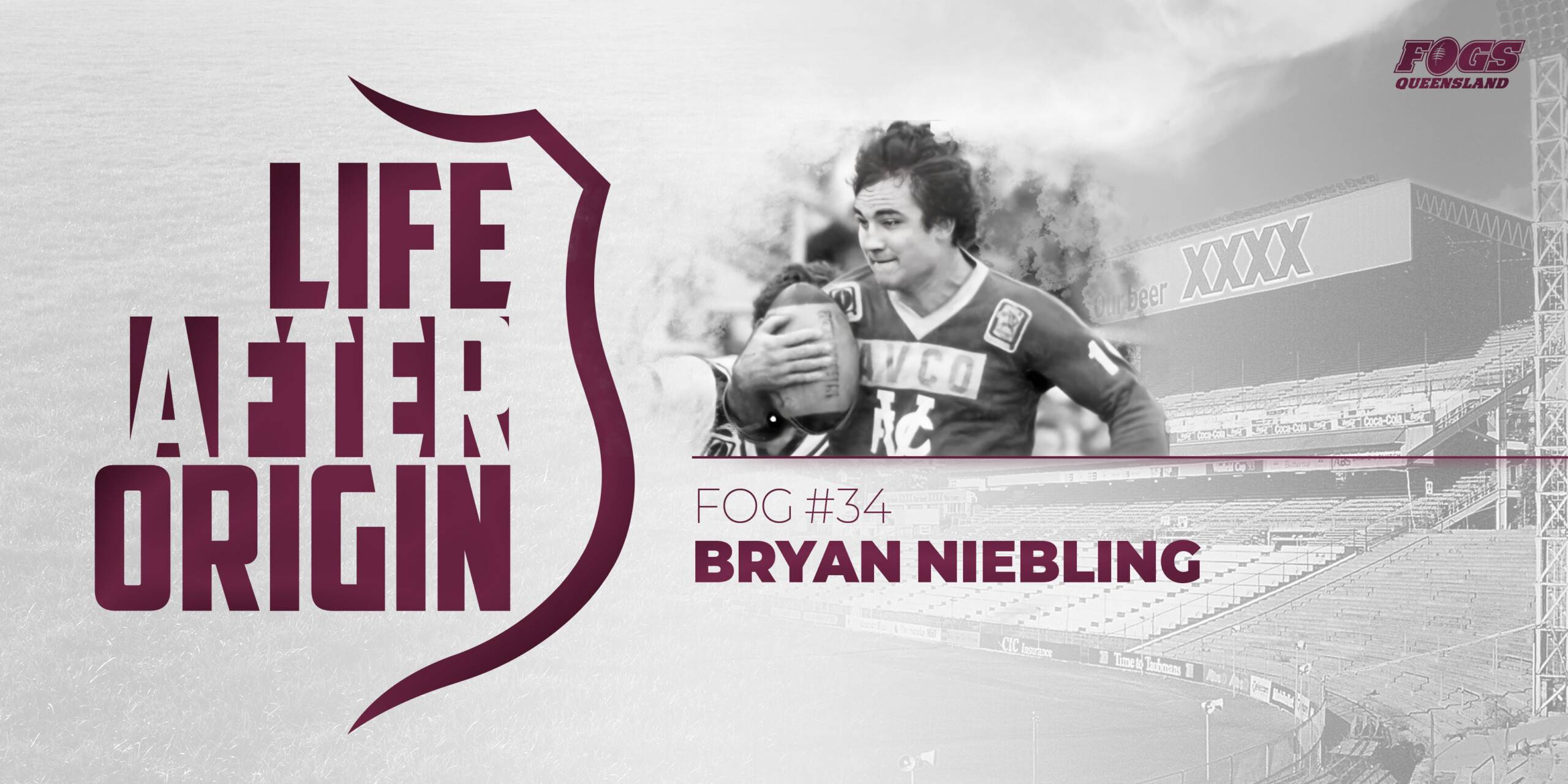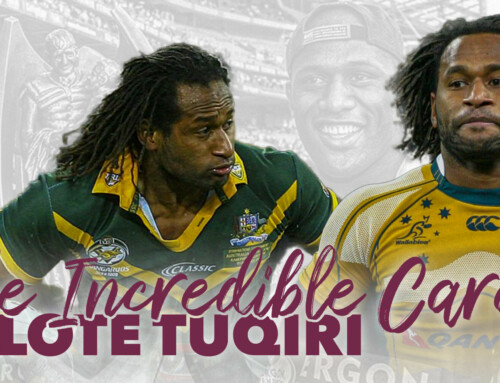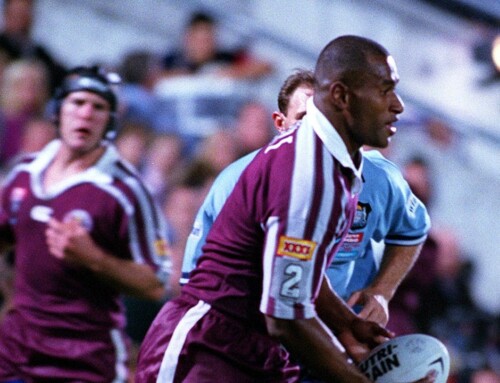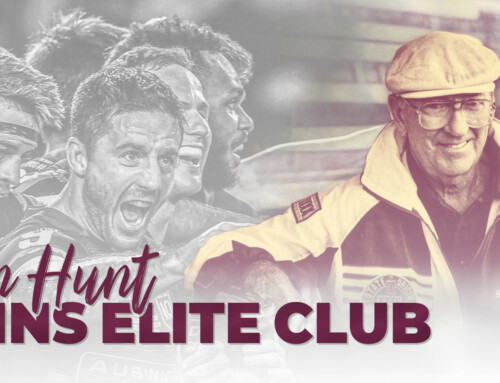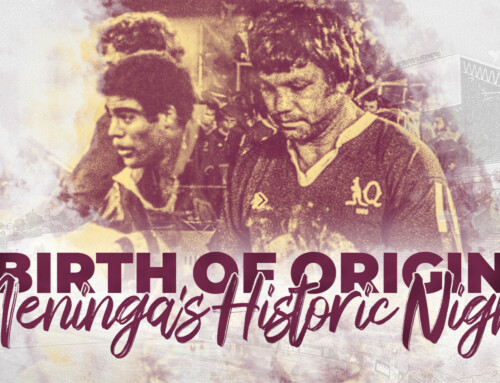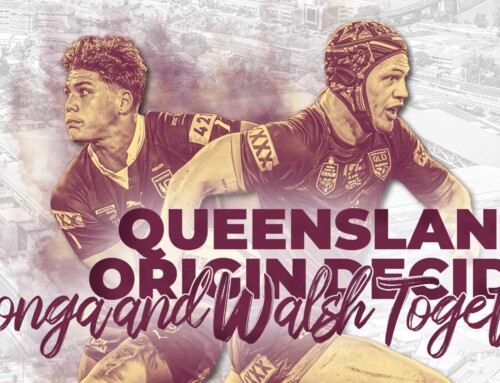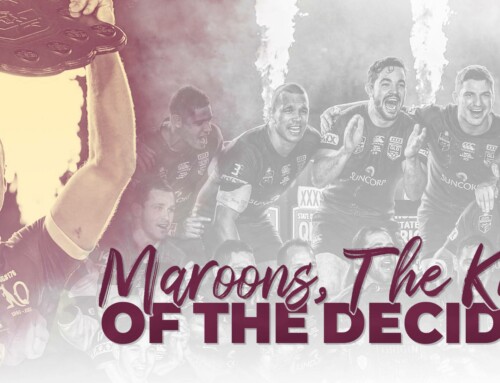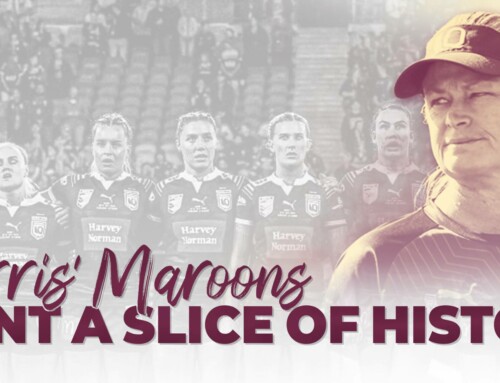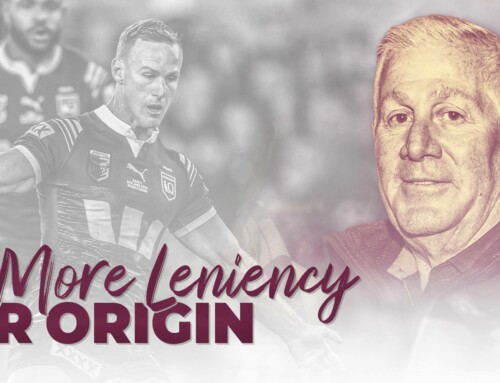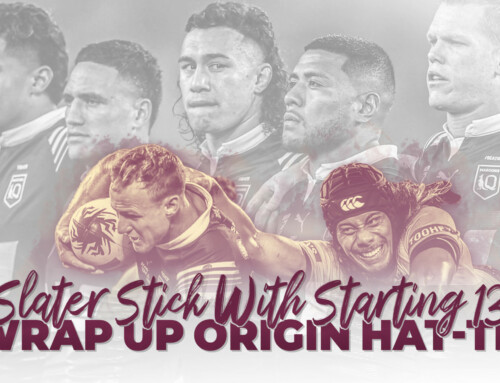Last week we launched our “Life After Origin” series by chatting with former Queensland forward Dave Brown.
This time we catch up with the man named “Horse” — Bryan Niebling.
As a teenager playing in Murgon, a rural country town some 250 kilometers northwest of Brisbane, Niebling attracted interest from a few Brisbane clubs who wanted him to move to the city.
For a township with a population of around 3,000 situated in the beautiful South Burnett region, Murgon has produced two Queensland and Australian rugby league representatives.
The year Niebling FOG#34 hung up his boots following a two-year stint with English club Hull KR in 89-91, a speedy young kid, also from Murgon – FOG#71 Steve Renouf — was emerging on the scene with the Brisbane Broncos.
Niebling, a Rothman’s medal winner as Brisbane’s best player in 1986, can lay claim to having turned down an of offer from up-and-coming young coach Wayne Bennett to leave Murgon and play for Brisbane Souths.
Most country players would have jumped at the chance to play under Bennett at the Broncos but Niebling had his heart set on being part of a winning A-grade premiership side with Murgon.
He made the move, but only after a delegation from rival Brisbane club Fortitude Valleys, which included a gun young player named Wally Lewis and a slightly eccentric coach, Ross Strudwick, turned up on his Murgon doorstep and convinced him to accept their offer.
Again though, he made them wait because he wanted to win a title with Murgon which was his number one priority at the time.
He accomplished that goal in 1979 before packing his bags and heading to Brisbane.
Niebling began his career with Valleys in 1980.
He then played for Redcliffe (1984-87), Brisbane Broncos (under Bennett) in their inaugural NRL season (1988-89) and ended his career with UK club Hull KR, where he 26 games in 1990-91.
By his own admission, he wasn’t the most gifted of players.
To be fair, he had some ball skills playing his early junior football in the halves, before eventually representing Queensland and Australia as a forward on the back of a strong work ethic which often saw him one of the first players picked.

In some ways, Niebling and another tackling tyro from Roma, Wally Fullerton-Smith, were prototypes for the likes of Gary Larson and Billy Moore and the modern-day tackling machines like Reuben Cotter — a key player in Queensland’s last two Origin successes.
In this chat, Niebling reveals how a young Lewis took him under his wing when he first came from Murgon and how the bond and friendship they forged became so close, they ended up being best men at each other’s wedding.

QUESTION: So Bryan, what are you doing with yourself these days?
NIEBLING: I’ve slowed down a little. I still do a bit of work as an orderly at North West Private Hospital, chasing the grandkids around and towing a caravan around a bit. I started off working in the (operating) theatre which was interesting but I like talking to people. During Covid when patients couldn’t have visitors, I used to sit with them in their rooms and have a chat and try and cheer them up. I met some interesting people and being from the country I could connect with them easily, and even the footy fans and a few old players.
QUESTION: How long did you live in Murgon and what, or who convinced you to move to Brisbane?
NIEBLING: I never really wanted to leave Murgon. I had mates there and played cricket and footy. I never really thought about going to Brisbane, all I really ever wanted to do was play first grade for Murgon and win a premiership, that meant a lot to me. I eventually went to Brisbane in 1980. I was 19, but I had one-year playing A-grade in Murgon before I made the move. I made the Wide Bay rep side that year and played against the touring Great Britain side in Maryborough. I was just a kid then playing against blokes like Jim Mills who was a beast, we didn’t go too bad. I remember Wayne Bennett came out to Murgon; guys like Brad Tessman, Mal Meninga, and myself, all played in the Queensland Under18 side in 1978. I think Brad and Mal went to Brisbane straight away but I wanted to stay in Murgon for another year and try to win a premiership. We ended up making it to the grand final and won the whole thing. Wayne spoke to me about playing for Souths but I told him I wanted another year in Murgon. Then Tommy Duggan (who played prop in Valleys 1979 premiership side) and Wally (Lewis) came out to Murgon and said: ‘You can’t go to Souths’, so I ended up signing with Valleys. I shook Wayne’s hand that I’d go to Souths in 1980 but after Valleys won the Brisbane premiership 26-0 in 1979, I decided to join them. Back then players didn’t have managers so you did your own deal. Wayne didn’t hold a grudge. I ended up playing for the Brisbane Broncos when they came along in 1988 and he got me the gig in England when Hull KR was looking for an experienced forward.
QUESTION: Much of your career centered around playing with Lewis, did you know early he was going to be something special and a great player?
NIEBLING: Wally was a year older than me, so we didn’t play under18s together but when I came down to Valleys it was obvious very quickly, he was different. He could just see things before they happened. I became his workhorse in many ways because he’d say to me: ‘Horse, run there or, Horse run here’. I would run to where he said and get belted and then I’d play the ball, and he’d score a try (laughing).
QUESTION: So what you are really saying is that it was you who made Wally look good for all those years?
NIEBLING: No, I wouldn’t say that (more laughter).

QUESTION: Was he the best player you ever played with?
NIEBLING: New South Wales and every other team put their best player against him and he would come out on top. I prefer to class players in decades. Maybe Wally would struggle to survive now, but the decade he played in, he was dominant. He played against the best when he played and he was the best, that’s all you can do. You have to remember we were semi-professional back in those days, we’d train and have a few drinks and we all had jobs, we worked five days a week, and then we’d go and give our all on a Sunday playing football. It is certainly nothing like it is now.
QUESTION: You spent a lot of time playing with Lewis can you tell us any stories about the King?
NIEBLING: He probably wasn’t the best trainer (laughing again).
QUESTION: Well Horse, you’re not giving any secrets away there.
NIEBLING: No I’m not, am I? At Valleys we would train on Monday night and then go out for a drink and you’d get hammered (at training) on Tuesday night. Wally always had an injury and we wouldn’t see him until we started playing touch. I’ve got a few stories but none I want to broadcast. Wally took me under his wing a little bit. I was a country kid and we got on really well. When he got married, I was his best man and when I got married, he was my best man. We were pretty good mates but after we changed clubs; I went to Redcliffe and Wally went to Wynnum Manly, we didn’t see as much of each other as we’d like, but we still keep in contact with texts and phone calls.
QUESTION: You played, again with Lewis, in the Brisbane Broncos’ very first NRL game at Lang Park in 1988, was that a special day to be part of history?
NIEBLING: The build-up was great. Manly had a pretty hot side with Fatty Vautin and a heap of other big names. We had a pretty good side too that was almost a Queensland rep side. You used to watch these sides play on TV and now you are in the weekly grind with them. Things though were very different back then. We’d fly from Brisbane to Sydney on a Sunday morning to play, say North Sydney, and we’d end up sitting underneath the Sydney Harbour Bridge for two hours waiting to play the game. These days you fly down a day or two earlier, get to train and prepare. I had a young child. I was getting up in the middle of the night changing dirty nappies, then I had to be at the airport at six in the morning. You’d get to Sydney and sit under the Harbour Bridge eating sandwiches before you played the game and then fly back home that night.
QUESTION: How did you pick up the nickname “Horse”?
NIEBLING: When I moved to Brisbane, I boarded at Tommy Duggan’s mothers-in-law’s house at Chermside. Her husband, who was a copper, had died and she lived by herself. I was still a kid, I’d never been away from my mum and dad, so when I came down, I boarded with her. She treated me like her son and she was my second Mum really.
She was a great cook and she would always ask me: ‘ok Bryan, what meal would you like tomorrow night’?. I’d jokingly say something like ‘Veal Cordon Bleu’, she could cook anything. Tommy came to visit one night and she told him I ate like a horse. Tommy was the King of nicknames at Valleys, he gave everyone a nickname, so he came to training and started calling me Horse. The nickname just stuck. Tommy wasn’t a big man, but he was tough. He was from Wondai and he toured New Zealand with Queensland in the 1970s. His brother Liam played for Queensland against Great Britain in 1968. Tommy was a good bloke. He had a very good eye for a country player, he got Chris Close to come to Valleys and Willie Carne to the Broncos.
QUESTION: You said you weren’t the most skillful player around; how would you describe yourself as a player?
NIEBLING: I was a worker. I realised I wasn’t as good as some other players but I felt if I did my job each week, trained hard, and played hard, never let anybody down, I would be alright. I used to go back to Murgon and there would be guys saying: ‘I was a better player than you’ and I’d say: ‘Yeah, but you didn’t want to train, you didn’t want to do the hard work, or make the sacrifices I was prepared to make’. What I did wasn’t fancy, 40 tackles a game, cart the ball up all day, don’t miss a tackle, don’t drop the ball, that’s what I based my game on. I did it every week whether it was for my club or representative football. When you don’t have all the skills you have to work a lot harder. My old coach Ross Strudwick once said in an interview with the Courier Mail when he picked his Valley’s sides that he would always pick me first because he knew exactly what he would get, and that was how I played and how I’d like to be remembered.
QUESTION: So do any of your kids or grandkids play rugby league?
NIEBLING: I have five grandchildren and they are all girls. My daughter Sophie, who has three daughters, is 34 and she is playing a grand final for the Dayboro Cowgirls at the weekend. She didn’t start playing rugby league until she was 33, I’m proud of her, she was a touch footy player before that and she has some good skills.
QUESTION: Finally Horse, what do you think of the changes to the game and the money players get paid these days, are you jealous when you hear forward getting a million dollars a season?
NIEBLING: I always said I was going to sue my parents for having me too early in life. I was getting a few dollars to play for Murgon and then at Valleys, it was like a sign-on fee and $200 a win bonus. Luckily, we used to play the match of the day a lot at Lang Park and won plenty of games. I remember I bought a Datsun Stanza from the Ekka Show after I came down from Murgon for $5,600. To buy a car like that today would be more than $40,000. They were great days. In all honestly, we had a really good life.
There were no mobile phones or the scrutiny that is on players today. I wouldn’t change one thing for quids. It was a fantastic time, I got to travel a bit of the world and I did it as a kid from the bush who never really wanted to leave town.


